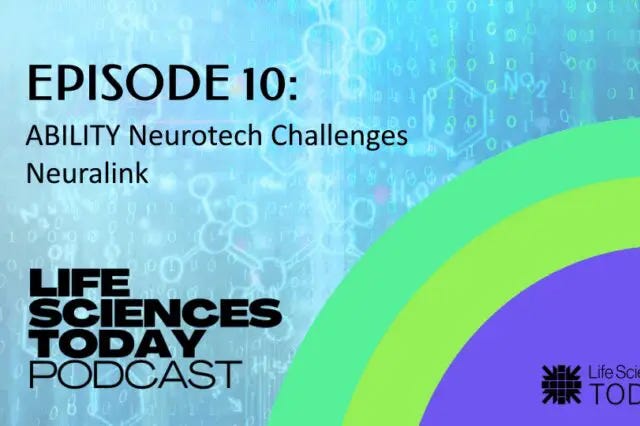If You Love, You Will Grow
3 rules for doing great work
The only way to do great work is to love what you do.
I recently bumped into this strange idea twice.
Once, on my Life Sciences Today podcast with Rotem Kopel, CEO of Ability Neurotech.
And again, over espresso in Tel Aviv, with a classical pianist named Irena.
Я сама себе завидую.
We’ll come to Irena in a moment.
For Rotem, Ability Neurotech is a labor of love.
They’re building a brain-computer interface that might just lap Elon Musk.
The episode ended with a surprise: we both love SciFi. A couple of aha moments along the way made it even better. Listen here:
Click here to listen ABILITY Neurotech Challenges Elon Musk and Neuralink
A Spring Day in Tel Aviv
Coffee with a potential client.
A perfect spring morning.
He's an MD with a large, successful medical aesthetics practice, looking to expand into personalized medicine.
Let’s call him Jack.
I asked him, “What’s your positioning? Like, I get what it is—but who is it for?”
He shrugs. “I don’t really know.”
Just then, two women sat down at the table next to us.
One leans over, “Is this a smoking area? Are you smokers? Because if you are, we’ll go somewhere else.”
Jack: “Nope. No smoke here.”
They stay. One of them, wearing a small red leather crossbody purse, catches Jack’s eye.
“That’s a very nice bag,” he says.
She raises an eyebrow. “What do you know about women’s bags?”
Jack grins. “I treat a lot of women. I see a lot of bags. I know a nice one when I see it.”
She laughs. “You treat a lot of women? My name’s Irena, by the way.”
Jack explains he’s a physician specializing in medical aesthetics. She tells us she’s a pianist.
I jump into the conversation. “You perform? Or teach?”
“I perform all over,” she says. “But it’s hard to make money from classical music. I hustle.”
I tell her, “I play sax in a big band—the Thelma Yellin Alumni Band, familiar?”
She comes back, “Of course I know Thelma Yellin, “Are you a professional musician?”
Jack cuts in, “No, he’s a consultant. Sold his company. Now advises life sciences execs on growing their business. He plays for fun.”
They talk about me in the third person for a while.
The two women finish their espresso. As she gets up, Irena turns to me:
“This is the part where you say, ‘Do you come here often?’”
“I haven’t used that line in 40 years,” I tell her. “But you can give me your number if you’d like.”
She flings it at me with a smile as they walk away.
Later that day, she texts me a ticket link to a concert she’s doing in an art gallery—Music and Sculpture.
I reply, “Hope you get a decent margin on the gate.”
She answers:
“In classical music, you don’t make much. But I’m very happy with what I do.
I started playing piano at age 5. It was love at first sight.
In Russian, we have a saying: Я сама себе завидую.
I envy myself.
I’m so lucky doing this, I can’t believe it—I even envy myself.”
Here’s the Thing About Tech Companies
You can’t grow your business if you hate your product.
I learned that the hard way.
At Flask Data, Jenya and I set out to simplify clinical data management.
Our first EDC was barebones but loved by users—until support tickets piled up.
Admin friction was killing us on site and user management.
So, we designed and rebuilt a sleek UX, slashing issues to zero.
Then, customers started demanding a self-service form designer.
I pushed my CTO to fork an open-source project—prioritizing speed over quality.
Big mistake.
The module was clunky, broke our style guide, and looked ugly.
Users noticed. “Why’s this so different?” they asked.
Deals slipped away.
I stopped loving the work—and it showed. Our growth stalled. I was no longer fanatical about success. I went into survival mode.
After selling the platform, I took time off to write and study neuroscience.
I distilled some lessons I wish I’d known 5 years earlier.
3 Rules for Doing Great Work
1. Guard your freedom.
Live modestly.
Every “need” is a want in disguise—another shiny toy that chains you down.
The more you want, the more you depend: on investors, on draining partners, on a paycheck.
And the more you’ll compromise your product and your values.
2. Love your work. Work on what you love.
If you want to be known for light and beauty—keep tending the flame.
Love your craft, not your LinkedIn likes.
Your product will love you back.
3. Love yourself.
Respect your body.
Respect your mind.
Respect your soul.
Critical thinking about your product, team, or GTM isn’t negativity—it’s clarity.
🎙 Life Sciences Today — My Podcast for Leaders
I host leaders in life sciences. We talk about their personal journey.
I dive into the business model and how they capture value—not just the tech.
If you're changing the game in drug development, clinical ops, or RWD—I’d love to feature you.
👉 Think you’d be a great guest? Schedule a short call here I’d love to host you!
👉 If you enjoy reading this post, feel free to share it with friends! Or feel free to click the ❤️ button on this post so more people can discover my writing. 🙏
About Me
I’m a former pharma-tech founder who bootstrapped to exit.
Now I help TechBio and digital health CEOs grow revenue—by solving the tech, team, and GTM problems that stall progress.
If you want a warrior to work by your side, DM me on substack, LinkedIn or X


